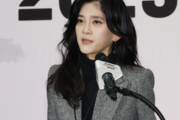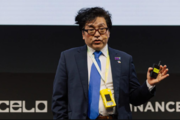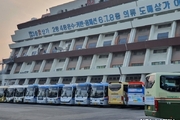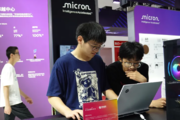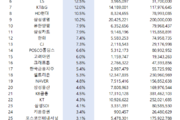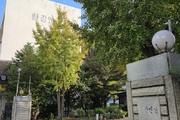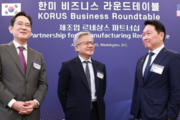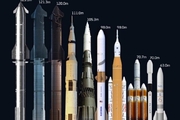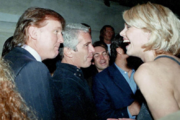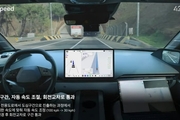
[News Space=Reporter seungwon lee] Hansung FI (CEO Youngcheol Kim), which had been holding a dividend feast despite a 70% drop in operating profit in 2023, turned to a deficit last year. Hansung FI is currently selling 'Taylormade Apparel', 'Renoma Golf', 'All For You', and 'O'Neill' brand products in Korea.
According to the audit report of the Financial Supervisory Service's electronic disclosure system on the 4th, Hansung FI's sales in 2024 will be 204.7 billion won, a 7.5% decrease from 221.2 billion won the previous year. In 2023, it also decreased by 7% compared to 2022 (237.9 billion won).
The company's sales trend is steadily decreasing, from KRW 289.8 billion in 2021, KRW 237.9 billion in 2022, KRW 221.2 billion in 2023, and KRW 204.7 billion in 2024, so maintaining sales in the KRW 200 billion range is also in danger.
Operating profit turned into a deficit. Operating profit plunged by 11.3 billion won, recording an operating loss of -6.5 billion won from 4.8 billion won the previous year. Net income also recorded a net loss of -6 billion won last year from a surplus of 3.7 billion won the previous year.
Operating profit also showed a steady decline from KRW 36.8 billion in 2020, KRW 30.2 billion in 2021, and KRW 14.1 billion in 2022, and eventually fell 66% year-on-year to KRW 4.8 billion in 2023, a single-digit figure. Net income also recorded KRW 25.4 billion in 2020, KRW 20.5 billion in 2021, and KRW 10.4 billion in 2022, but only KRW 3.7 billion in 2023, a 65% decrease from the previous year.
As the management situation turned into a deficit with operating loss, net loss, etc., and cash liquidity was difficult, no dividends were paid in 2024. Hansung FI has consistently paid dividends of KRW 4 billion in 2021, KRW 5 billion in 2022, and KRW 3 billion in 2023. Hansung FI is effectively a family business, with CEO Kim Young-cheol owning 50% and Kim Young-doo and other special related parties owning 50%.
Total debt was 72 billion won, total capital was 196.9 billion won, and the debt ratio was 36.57%.
If we analyze sales by sector, we can see the deterioration in profitability. First, sales of goods were 4.8 billion won, sales of products were 193.6 billion won, and sales of other products were 6.2 billion won. Of these, sales of goods fell 7.24% from 208.7 billion won the previous year, and sales of goods also fell 25% from the previous year.
Product sales are sales generated by selling goods that a company has manufactured through its own manufacturing process. On the other hand, merchandise sales are sales generated by selling finished products purchased from outside without any additional processing.
Sales management expenses were 122.4 billion won, of which 12.5 billion won was for salaries, 63 billion won for commissions, 5.9 billion won for advertising and publicity, 12.1 billion won for sales commissions, and 590 million won for entertainment expenses. Commissions, which account for a significant portion of the company’s operating expenses, refer to external service and service costs (advertising, public relations, marketing agencies, etc.), transactions with special related parties (rent and other service fees), and other operating expenses.
In particular, it is noteworthy that out of the KRW 63 billion in payment fees, KRW 4.7 billion was paid to Hansung Global, a special related party, and KRW 180 million was paid to Hansung GS.
Included was an impairment loss of 850 million won in tangible assets. An impairment loss on tangible assets is an indicator that shows that the value of a company's physical assets (e.g., buildings, machines, etc.) has decreased. It occurs when the asset is expected to no longer generate the economic benefits expected, and the book value of the machine is reduced and the reduced amount is recognized as a loss.
A loss of KRW 130 million was incurred under the equity method of an affiliated company (an accounting method that recognizes the investment ratio of the invested company’s net income or net loss). This loss occurred due to the deterioration of the financial status of an affiliated company (Pums Co., Ltd., with a 30% stake) in which Hansung FI invested. As Pums Co., Ltd. ceased business operations, its net assets on the financial statements decreased or turned into a deficit.
Ultimately, both losses had a negative impact on the company's financial position and profitability.
In addition, short-term borrowings increased by 125% from 11.4 billion won the previous year to 25.7 billion won. The collateral for the borrowings is 74.5 billion won in land/buildings and 8 billion won in short-term financial products, totaling 82.4 billion won. It was also revealed that there are 8.9 billion won in accounts receivable.
A fashion industry financial expert explained, "Short-term borrowings refer to short-term loans that companies must repay within a year. They are mainly used when companies need urgent funds, and are utilized to cover short-term funding needs such as the company's operating expenses, trade receivables, and employee salaries." He added, "A sharp increase in short-term borrowings can be interpreted as a signal that it is difficult to cover the company's operating expenses with only cash earned from operating activities."
He also emphasized, "Short-term borrowings have short maturities, so there is a lot of pressure to repay them, and the interest rates are relatively high. Therefore, if the increase in borrowings continues, the company's financial stability may be weakened." He added, "In particular, if there are not enough liquid assets to repay short-term borrowings, there is a possibility that the company may face a liquidity crisis."
In other words, a sharp increase in short-term borrowings is evidence that the company's cash flow has deteriorated or that unexpected expenses have occurred. It can also send a negative signal to investors and financial institutions. It suggests that the company is relying on short-term financing rather than long-term financial planning.
Retained earnings, which show the vulnerability of the capital structure, fell 2.9% to KRW 196.2 billion from KRW 202.2 billion the previous year. The decrease in this amount appears to be due to the net loss for the period and dividend payments for several years.
In particular, there are as many as 12 legal disputes pending, an increase of 4 from 8 in 2023.
Among these, there are 4 cases filed by the company (the amount in litigation is 700 million won) and 8 cases in which the company is sued (the amount in litigation is 240 million won). The company's financial statements do not reflect the adjustments that may occur due to this uncertainty.
In addition, 800 million won out of the 6.9 billion won in rental deposits is concentrated in special related parties (Sanullim, etc.).
There are two major royalties that Hansung FI, which has a licensing agreement with Taylor Made Golf Company, Inc., must pay. There is a minimum royalty of KRW 2.56 billion (KRW 1.267 billion in accrued expenses + KRW 1.293 billion in prepaid expenses) that is fixed regardless of sales volume, and an excess royalty that must be calculated and paid additionally when cumulative sales exceed a certain standard.
In addition, Hansung FI acquired and registered the trademarks of Renoma and Giovanni Valentino, and is signing royalty contracts with other domestic companies. Currently, approximately 1.6 billion won of the minimum royalties received in relation to the royalty contracts have been recorded as unearned revenue.
In response to inquiries regarding the article content, Hansung FI PR Agency stated, “It is difficult to provide a detailed response.”








